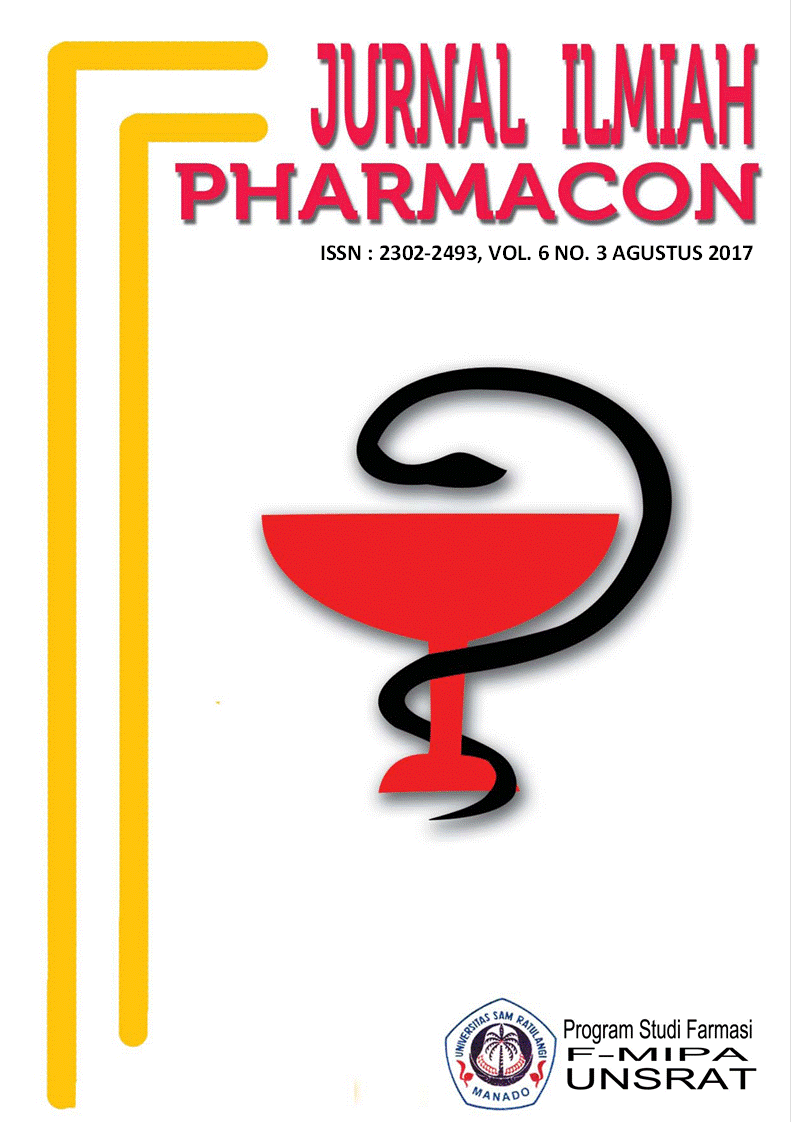IDENTIFIKASI BAKTERI PADA PLAK GIGI PASIEN DI PUSKESMAS BAHU MANADO DAN UJI RESISTENSI TERHADAP ANTIBIOTIK GOLONGAN PENISILIN DAN SEFALOSPORIN
DOI:
https://doi.org/10.35799/pha.6.2017.16934Abstract
IDENTIFIKASI BAKTERI PADA PLAK GIGI PASIEN DI PUSKESMAS BAHU MANADO DAN UJI RESISTENSI TERHADAP ANTIBIOTIK GOLONGAN PENISILIN DAN SEFALOSPORIN
Â
Anisa Mellani Amelia Turangan1), Fatimawali1), Henki Rotinsulu1)
1)Program Studi Farmasi FMIPA UNSRAT Manado, 95115
Â
ABSTRACT
Â
           Dental plaque is a disease that most commonly found in the oral cavity of Caries and Periodontal, so it is a major problem of oral and dental health. The treatment used to control dental plaque is usually an antibiotic. This study aims to determine the resistant levels of bacteria isolated and identified from dental plaque against Penicillin (Ampicillin) and Cephalosporin (Cefadroxil) antibiotics. This research was conducted by taking samples of dental plaque to be isolated, bacterial identification and resistance test against antibiotics according to CLSI standard (Clinical Laboratory Standards Institute) using disc diffusion method. The results of this study shows that the identified bacteria from dental plaque isolates are Bacillus sp., Enterococcus sp., Streptococcus sp., Veillonella sp., and Lactobacillus sp., which is resistant to Ampicillin antibiotics. Types / genera of Bacillus sp., Streptococcus sp., and Lactobacillus sp., shows intermediate action against antibiotics Ampicillin, as well as species / genus of bacteria Veillonella sp., shows sensitive action to antibiotics Ampicillin. Type / genus of bacteria Enterococcus sp., Veillonella sp., and Lactobacillus sp., shows resistant action to Cefadroxil antibiotics. Types / genera of Bacillus sp., and Streptococcus sp., shows intermediate action against Cefadroxil antibiotics, as well as species / genera of Bacillus sp., Lactobacillus sp., Enterococcus sp., and Streptococcus sp., shows sensitive to Cefadroxil antibiotics. Antibiotics Ampicillin have a high resistance to bacteria isolated from dental plaque by 58%.
Â
Keywords: Dental plaque, antibiotics, bacteria
ABSTRAK
           Plak gigi merupakan penyakit yang paling banyak dijumpai di rongga mulut yaitu Karies dan Periodontal, sehingga merupakan masalah utama kesehatan gigi dan mulut. Pengobatan yang digunakan untuk mengontrol plak gigi biasanya adalah antibiotik. Penelitian ini bertujuan untuk menentukan tingkat resisten bakteri yang diisolasi dan diidentifikasi dari plak gigi terhadap antibiotik golongan Penisilin (Ampisilin) dan Sefalosporin (Sefadroksil). Penelitian ini dilakukan dengan mengambil sampel plak gigi untuk diisolasi, identifikasi bakteri serta uji resistensinya terhadap antibiotik sesuai standart CLSI (Clinical Laboratory Standards Institute) dengan menggunakan metode disc diffusion. Hasil penelitian ini menunjukan bakteri yang teridentifikasi dari isolat plak gigi adalah Bacillus sp, Enterococcus sp, Streptococcus sp, Veillonella sp, dan Lactobacillus sp resisten terhadap antibiotik Ampisilin. Jenis/genus bakteri Bacillus sp, Streptococcus sp, dan Lactobacillus sp intermediate terhadap antibiotik Ampisilin, serta jenis/genus bakteri Veillonella sp sensitif terhadap antibiotik Ampisilin. Jenis/genus bakteri Enterococcus sp, Veillonella sp, dan Lactobacillus sp resisten terhadap antibiotik Sefadroksil. Jenis/genus bakteri Bacillus sp dan Streptococcus sp intermediate terhadap antibiotik Sefadroksil, serta jenis/genus bakteri Bacillus sp, Lactobacillus sp, Enterococcus sp, dan Streptococcus sp sensitif terhadap antibiotik Sefadroksil. Antibiotik Ampisilin memiliki tingkat resisten yang tinggi terhadap bakteri yang di isolasi dari plak gigi sebesar 58%.
Â
Kata kunci : Plak gigi, antibiotik, bakteri
Â
Â
Downloads
Published
How to Cite
Issue
Section
License
Authors who publish with this journal agree to the following terms:
- Authors retain copyright and grant the journal right of first publication with the work simultaneously licensed under a Creative Commons Attribution-NonCommercial 4.0 International License that allows others to share the work with an acknowledgement of the work's authorship and initial publication in this journal.
- Authors are permitted and encouraged to post their work online (e.g., in institutional repositories or on their website) prior to and during the submission process, as it can lead to productive exchanges, as well as earlier and greater citation of published work (See The Effect of Open Access)










